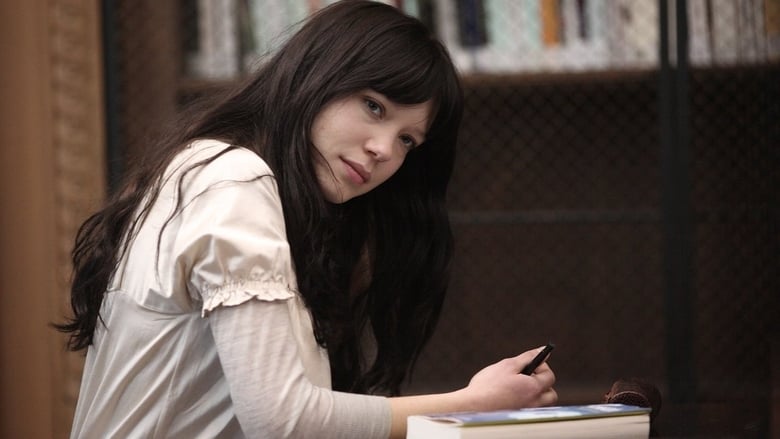

The Beautiful Person (2008)
In the wake of her mother's tragic death, French teenager Junie transfers to a different high school. Though Junie lives mostly inside her own head, her beauty and stoicism win her the attention of the entire male student population. Junie begins dating the gentle Otto Cleves, but finds herself intensely drawn to her youthful Italian language teacher, Nemours. When Nemours begins to reciprocate, serious complications ensue.
Watch Trailer
Cast


Reviews
After her mother's death, a pretty teenage girl (Lea Seydoux) moves in with relatives and attends school with her male cousin. She quickly gets embroiled in the dizzying affairs of her cousin's clique of friends and young teachers. There are straight affairs, gay affairs, straight love triangles, gay love triangles, bisexual love triangles, teacher-student affairs, teacher-student love triangles--really you need some kind of chart to keep track of it all. "Junie", the protagonist, first gets involved with "Otto", the shy odd-man-out in all these sexual shenanigans (perhaps because he's the only one with a decent haircut), but she soon finds herself drawn to the young Italian teacher (Louis Garrel), who is already involved with another student in the clique AND a fellow teacher.This kind of sounds like a French bedroom farce--especially a scene where one character drops a lurid love letter from his pocket and everyone thinks it belongs to the Italian teacher, leading to all kinds of misunderstandings. But this movie is actually very moody and gloomy--even tragic at one point. All these liaisons don't seem to leave anyone very happy. In that respect this kind of reminded me of Catherine Breillat film, but it also has a surprising lack of sex scenes (aside from one strange scene where Seydoux bares her breasts for her boyfriend in what looks to be a school hallway or the streets of Paris). It is also strangely anachronistic. It's a modern-day film judging from the occasional use of cell phones, but the characters still pass notes instead of text messaging. And I guess it must be perfectly legal in France for teachers to carry on with students because no one even remarks on it. (Of course, everyone here LOOKS like they're in their twenties). I guess France is just a different place--at least their movies certainly are.Seydoux is pretty good here even if her character is frustratingly opaque. She and Anais Demoustier (who has a small part in this and would appear with Seydoux again later in a similar film called "Le Belle Epine") might be the only girls prettier than their male co-star Louis Garrel, who has appeared in seemingly every other French film since making his mark in Catherine Breillat's 2007 film "The Last Mistress". It is Seydoux though who is perhaps on the verge of true international fame with a starring role in "Farewell, My Queen" and in the upcoming Cannes-winner "Blue is the Warmest Color". This is kind of strange movie for a lot of reasons, but it's also actually pretty good.
Christopher Honoré's La belle personne is a compelling curiosity; transposing the courtly world of Madame de La Fayette's classic 17th century story, La Princess de Cleves to a modern-day French lyceé (with its own courtyard), the film is a compelling observation of "courtly" love in a postmodern world; although it would be convincing to argue La belle personne is not very modern in its presentation of present-day bourgeoise Parisian etudiants. This is a world that exists in its own hermetically-sealed bubble, free from Facebook and the internet. It's a world where 60s navel-gazing reigns supreme.The film follows the tribulations love brings, or perhaps more realistically, the tribulations of what one perceives as 'love', even if it's unconsummated. The title alludes to 17-year-old Junie (Léa Seydoux), whose aura and presence recalls a ghostly incarnation of Godard's muse Anna Karina (Perhaps a self-conscious homage to Godard by the FEMIS-teaching Honoré?). Following the death of her mother, Junie refuses to live with her father (for unknown reasons), choosing instead to live with her cousin, Mathias, in a haute-bourgeoisie Parisian arrondisement close to the school she and Mathias attend. ' Soon enough Junie becomes the default objet d'amour for the male etudiants, namely love-sick Otto (Grégoire Leprince-Ringuet) at first. However, she soon troubles the cad-in-school Italian teacher, Nemours (the lanky yet ever-foppish Louis Garrel) with her otherworldly presence, prompting him to quickly end two amorous entanglements with a middle-aged fellow teacher and a stubborn 16-year-old female student. However, as one would expect fron the source material, tragedy foreshadows this story but it does not detract from this near-perfect made-for-TV drama. Every performance is realistic and natural. Special kudos to Garrel and Sedoyx for their work here. Honore follows the mis-step that was Chansons D'amour with this elegant, masterfully composed concoction; even if you could argue La belle personne seems to be an inverse reworking of Chansons. With the ensemble of regulars (Garrel, Hesme, Mastroianni, Leprine-Ringuet etc), traversing both films, La belle personne perversely feels like a sequel somehow taking place in a parallel world to Chansons. In spite of some questionable if strained directorial nods to the Nouvelle Vague (mentioning them would spoil the end), Honoré shows restraint and an uncharacteristic sense of detachment. The way he directs Seydoux is a revelation. Her ghostly presence haunts the film in every aspect and should be noted as a performance of great integrity and resolve from this promising actress. As a modern-day exploration of courtly love, La belle personne, is worth seeing numerous times to catch the many subtleties it withholds on first viewing.
and that pretty well sums up the deepest message of this adaptation of "La Princesse de Clèves". Having seen this at the 33rd Cleveland International Film Festival, I will admit to not having an appreciation of Christophe Honore's other work, have not read the book, nor did I recognize any of the actors. The film is put together reasonably well technically. Everyone is young, thin and good-looking, with many a fine pout below a classic Gallic countenance. There were (too) many relationships to track on a first viewing, and I did not understand the motivation for most of the characters. Why does everyone fall in love with Junie? Why does she break down and cry in class? As a high school-age tale, the self-absorbed interpersonal world is apt, with enough sexual tension and romantic intrigue to satisfy the requirements of this genre.
After teaching us the art of levity with his splendid "Les Chansons d' Amour", Cristophe Honore tackles a loose adaptation of the Princess Des Cleves in a modern day Parisian high-school. Junie, a new comer in mid-term, joins her cousin's class, and soon afterwards gets entangled in the game of love. Otto, a boy that I would term the common denominator of serious lovemaking and affection in the film, of stably pursuing his affection towards Junie, is in a way our guarantor in the film of common sense and, at least for me, someone to identify with. His friends term him simpleton when he admits his embarrassment on how to get closer to Junie. But that happens admirably quickly and unaffectedly from both parts, even though we get to understand that Junie has recently lost her mother, that is why she came to school at this time of the year and why she gives way to moods of grave beauty.We are then introduced to the third main character, the one who is given ample presentation in a way, Nemours, a somewhat winning womanizer of both his fellow teachers and students, teacher of Italian.In one of his classes, and under the spell of Callas' Lucia di Lammermoor, Junie gets, for reasons no one probes, overwhelmed with emotion - this is the decisive moment, when Nemours and Junie pierce each other with glances signifying love.Next step, a miscast letter, that everyone thinks is Nemours' and that is being addressed to Junie, finally gets into Junie's hands - yet it is, as we come to learn, her cousin's, addressed to a boy, whence the pressure to retrieve it, though with admirable clarity and absurdity Junie surmises that it is a letter really written to her by Nemours, even though he plainly denies it. Clarity and absurdity go here together because, even though it was not addressed to her, it was she that was actually the addressee, it was meant for her.And as everything that is written means tragedy, it soon arrives. Junie, even if having claimed the letter, does not give in to Nemours' lovemaking, but instead gives herself to Otto, after having tenderly and mischievously given him just before a children's book with the title Otto, and half-said to him that there is another person involved. That is really finely crafted by C.Honore in a visual geometry of passion. Eventually, Otto learns that something is going on between Junie and Nemours and calmly tries to confront it with Junie, yet, there is misunderstanding involved: the person who witnessed them, witnessed wrongly that the two kissed, from the perspective he saw them. That is why Junie rebuts Otto's claim; that way, and as it should be, we loose the common denominator in love's proceedings, and love becomes fatal. Otto does not believe her, and in doing so, does not love her any more. He takes it for a blatant lie and soon afterwards after literally singing away his despair, he commits suicide. From that point on, Junie decides not to give herself to Nemours on grounds that their love will last for some time then expire, ranging it to the hordes of commonality, thing impossible, since Otto, by his suicide, raised the standard to such a degree, namely and actually loving her all his life, that anything less will be degrading. So, after this explanation, she leaves it all behind.Up until somewhere in the middle of the movie I was still wondering to what kind of explosion C.Honore's boiling sourdine will give in, but I felt in a way that the film regressed to some kind of mannerism, in using devices of the two films that came before it, namely the singing in exactly the same tone, and using an actor/singer of the "Chansons d' Amour", right before Otto's suicide, and then, the cut editing in a somber interior reminiscing the technique involved in "Dans Paris", when Junie and Nemours finally meet, the two of them, alone, inside. It may seem trifle, yet I took it as regressive, since C.Honore set himself the standard so high!That said given the fact that this was made for TV, it is of superlative quality as any film we come to expect from French film-makers. Also the fact of watching the same team of actors playing in two films in a row, gives one a rare warm feeling and the wish that they would go on for some more!Even the fleeting presence of Chiara Mastroianni! The subplot is a pleasure, too: the way the two young boys' love is presented in a mocking documentary fashion; and the way in their case the third party reacts, recurring to violence, not contending himself, as happens in the other triangle, to the violence of words.The photography is very good: a gripping, nuanced grayness allover finely portraying the incidents, and at one point, the beautiful faces of the adolescents, not exactly like the rococo fresco coming in the middle of the sequence, but the way a grave, beautiful Giotto stares us. The denouement may not be as sublime as the "beautiful faces" are, but maybe this is the point.




